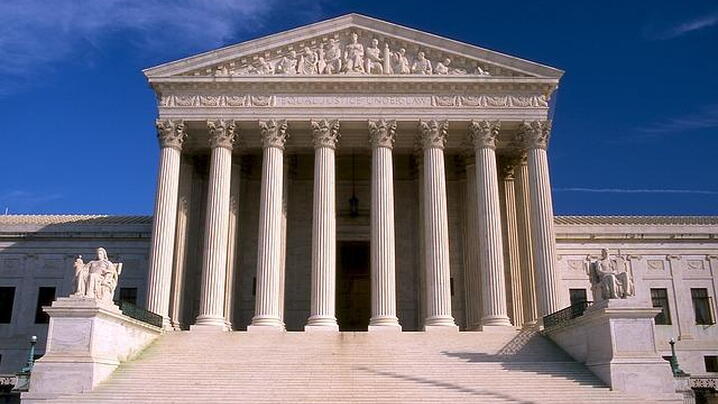
by Lisa Soronen, executive director, State and Local Legal Center
One of the questions the Supreme Court may decide in Trump v. Hawaii is whether lower federal courts have the authority to provide injunctive relief that benefits non-parties as well as the party asking for relief. The State and Local Legal Center (SLLC) filed an amicus brief arguing in favor of lower federal courts authority to issue injunctive relief that benefits non-parties.
In this case, Hawaii, the Muslim Association of Hawaii, and three individuals sued President Trump claiming the third travel ban, which indefinitely prevents immigration from six countries: Chad, Iran, Libya, North Korea, Syria, and Yemen, was illegal and unconstitutional.
In December 2017, the Ninth Circuit temporarily struck down the third travel ban. Instead of limiting the injunction to just the parties that sued the president, the Ninth Circuit issued an injunction applying to “foreign nationals who have a credible claim of a bona fide relationship with a person or entity in the United States.” The Supreme Court agreed to review the Ninth Circuit’s decision.
The federal government argues that lower federal courts do not have the authority to issue injunctions that benefit anyone other than the party asking for the injunction.
The SLLC amicus brief disagrees. The brief points out that injunctions benefiting non-parties are extremely common. “In fact, they have figured in many [Supreme] Court cases. This is why the courts of appeals have unanimously held that injunctions may benefit non-parties.” The brief argues these injunctions are especially important where federalism is at stake. Most local governments have smaller populations. They lack the resources to litigate against the United States. So local governments have to rely on one of the big cities to get injunctions against the federal government (no matter what political party is currently in charge).
The SLLC brief does not take a position on whether the lower courts in this particular case had the authority to issue an injunction that benefited non-parties. Likewise, the SLLC brief didn’t take a position on the other legal issues in this case.
The Supreme Court has agreed to decide three other issues. First, whether the case is justiciable, meaning whether the legal issues are “fit for review.” Second, whether the third travel ban exceeds the president’s authority under the Immigration and Nationality Act (INA). Third, whether the travel ban violates the Establishment Clause.
In Hawaii v. Trump, the Ninth Circuit concluded the travel ban exceeds the president’s authority under the INA because it bans immigration indefinitely and “ma[de] no finding whatsoever that foreign nationals’ nationality alone renders entry of this broad class of individuals a heightened security risk to the United States.” The Fourth Circuit ruled it likely violates the Establishment Clause because its primary purpose is to discriminate against Muslims.
Stuart Banner of the UCLA School of Law Supreme Court Clinic wrote the SLLC amicus brief, which the following organizations joined: National League of Cities, International City/County Management Association, and International Municipal Lawyers Association.
Related Resources
State and Local Legal Center. This link takes you to the State and Local Legal Center website, where you can find the full amicus brief for this case and other cases important to local government.
Ninth Circuit Temporarily Strikes Down Third Travel Ban. This blog post goes into more detail as to why the Ninth Circuit Struck down the travel ban.
New, Reduced Membership Dues
A new, reduced dues rate is available for CAOs/ACAOs, along with additional discounts for those in smaller communities, has been implemented. Learn more and be sure to join or renew today!
